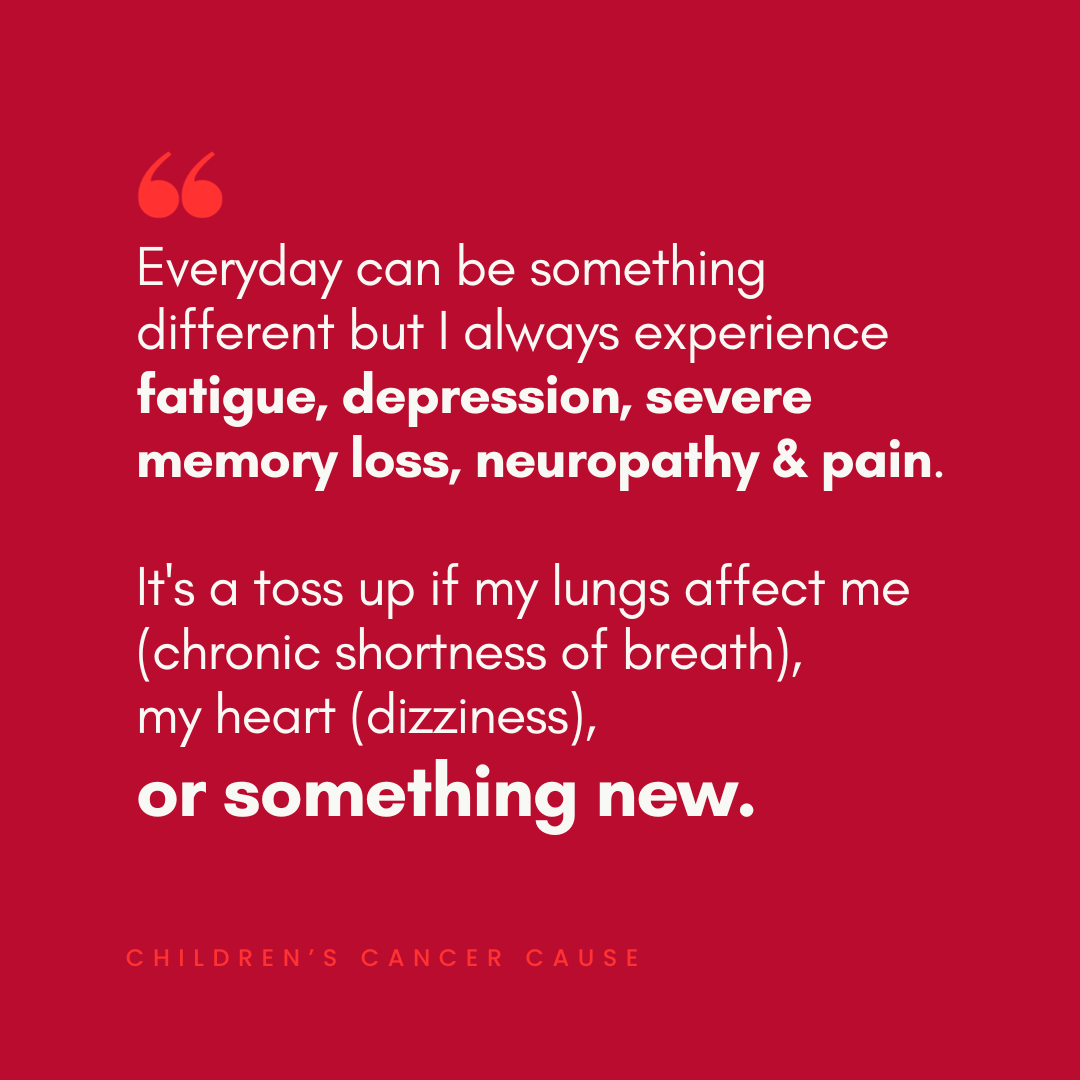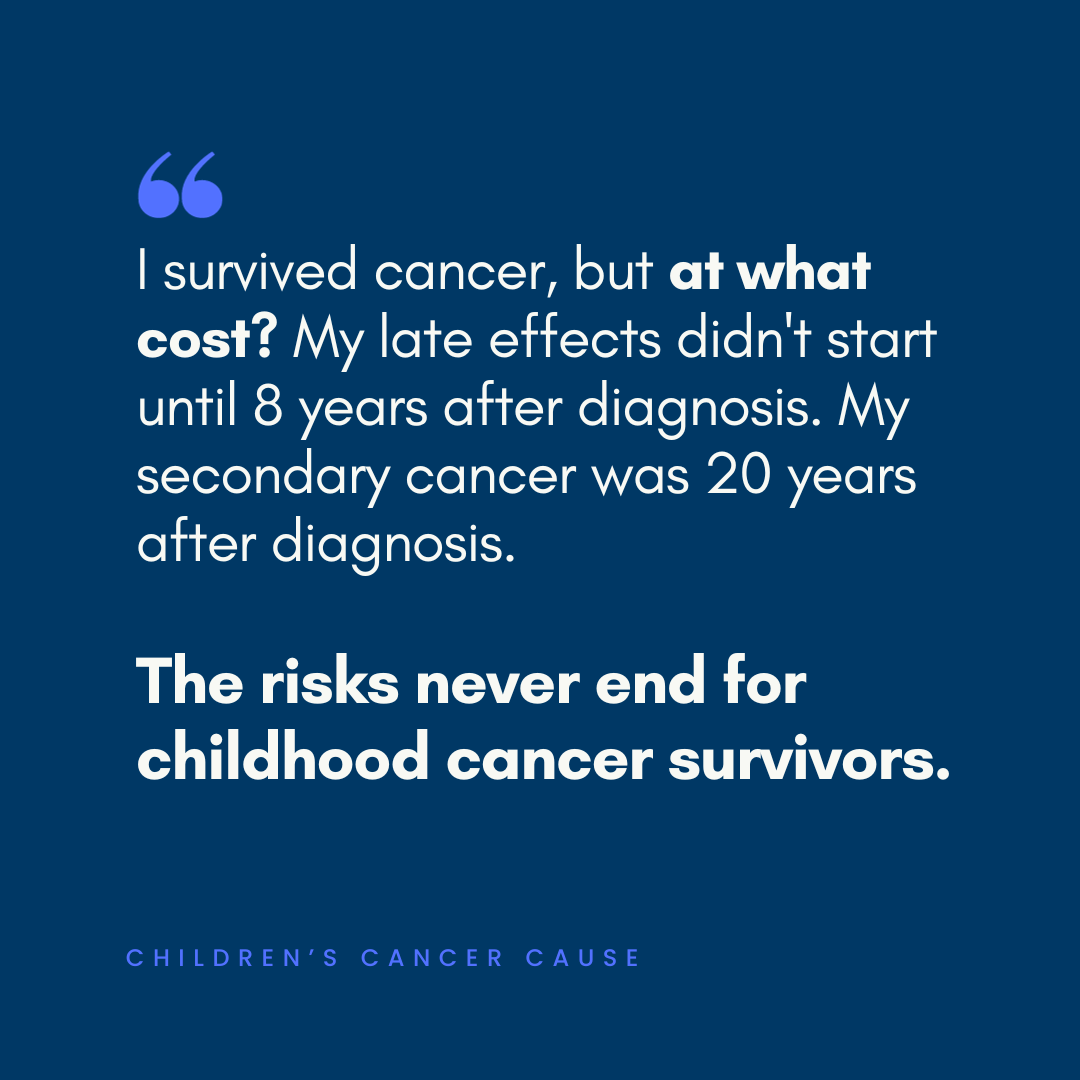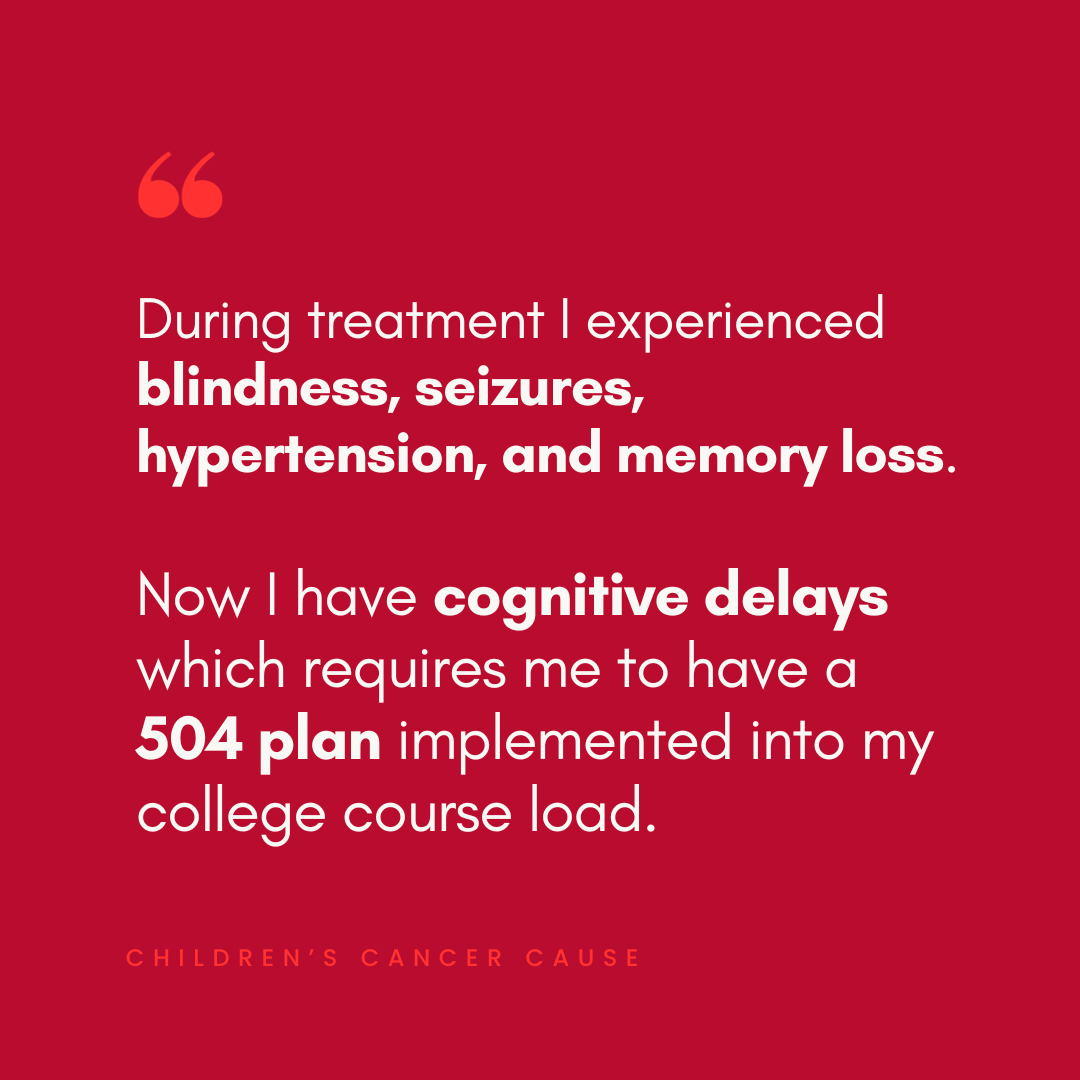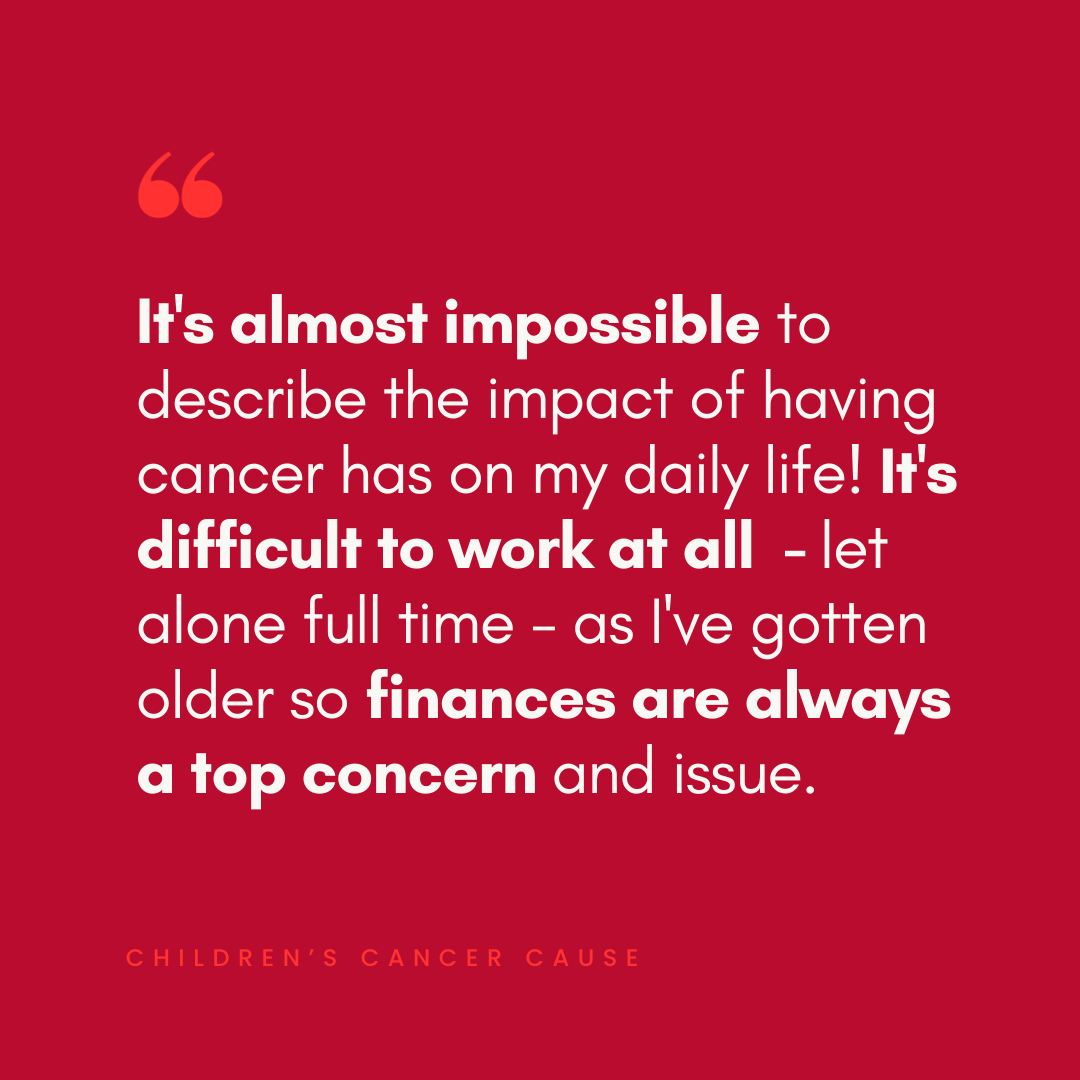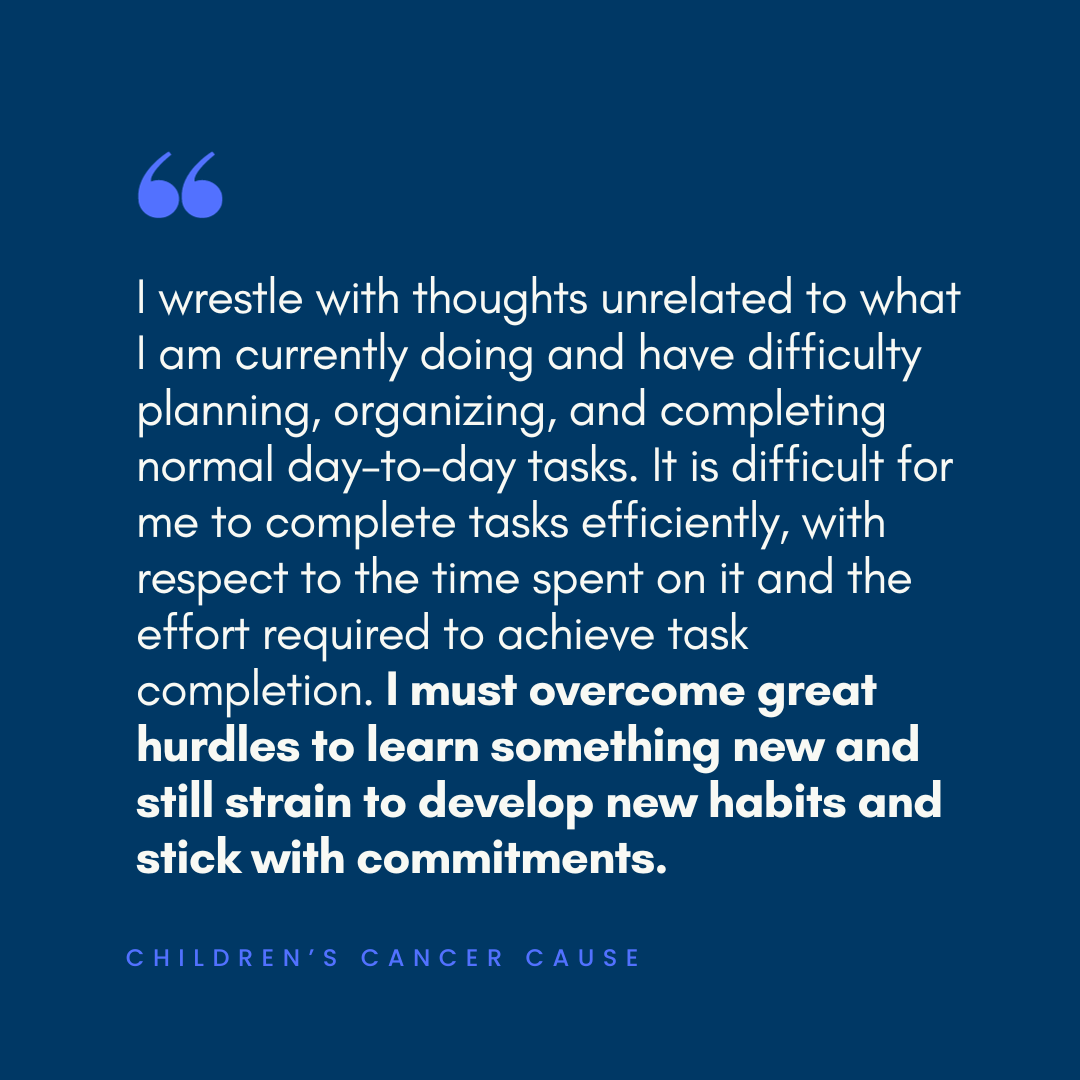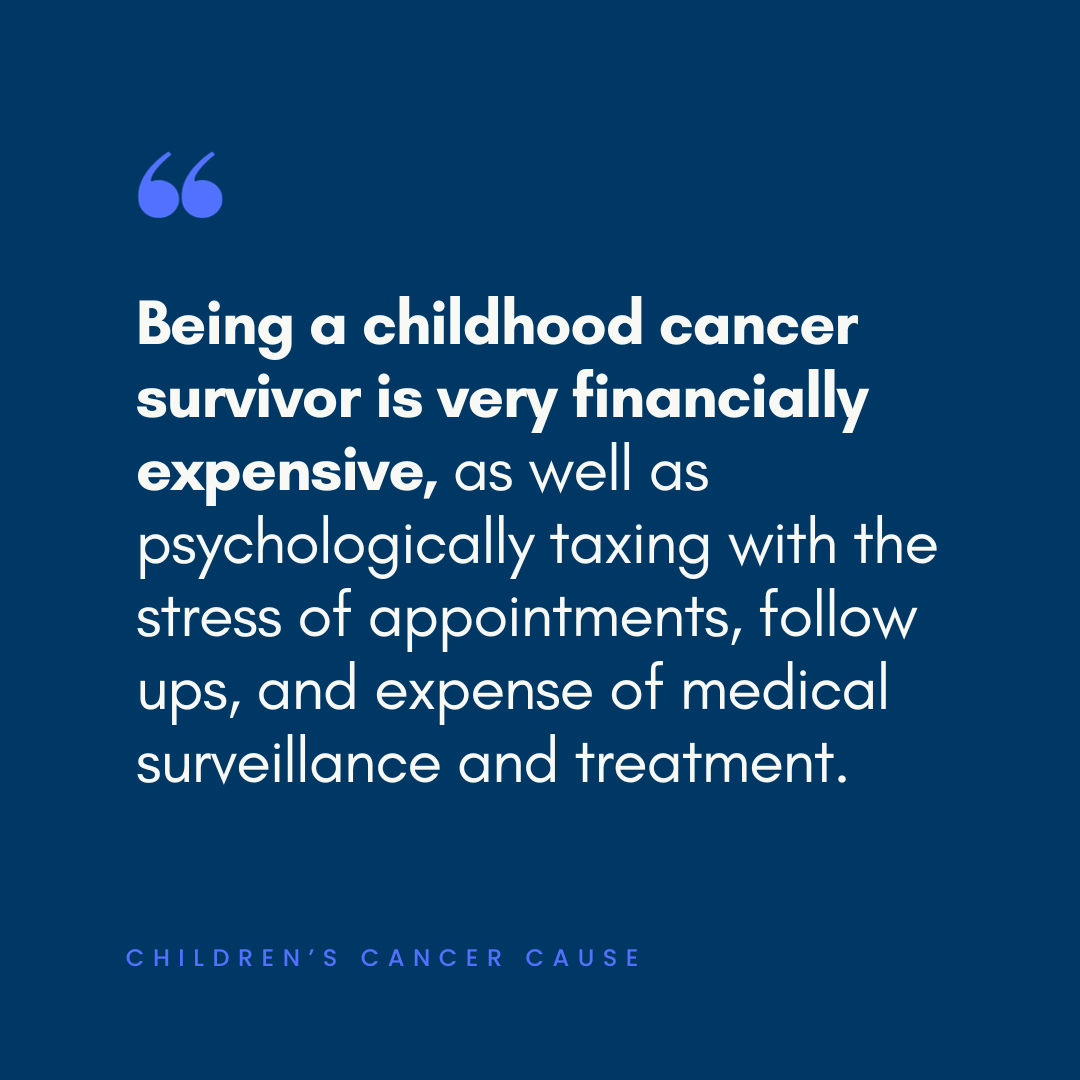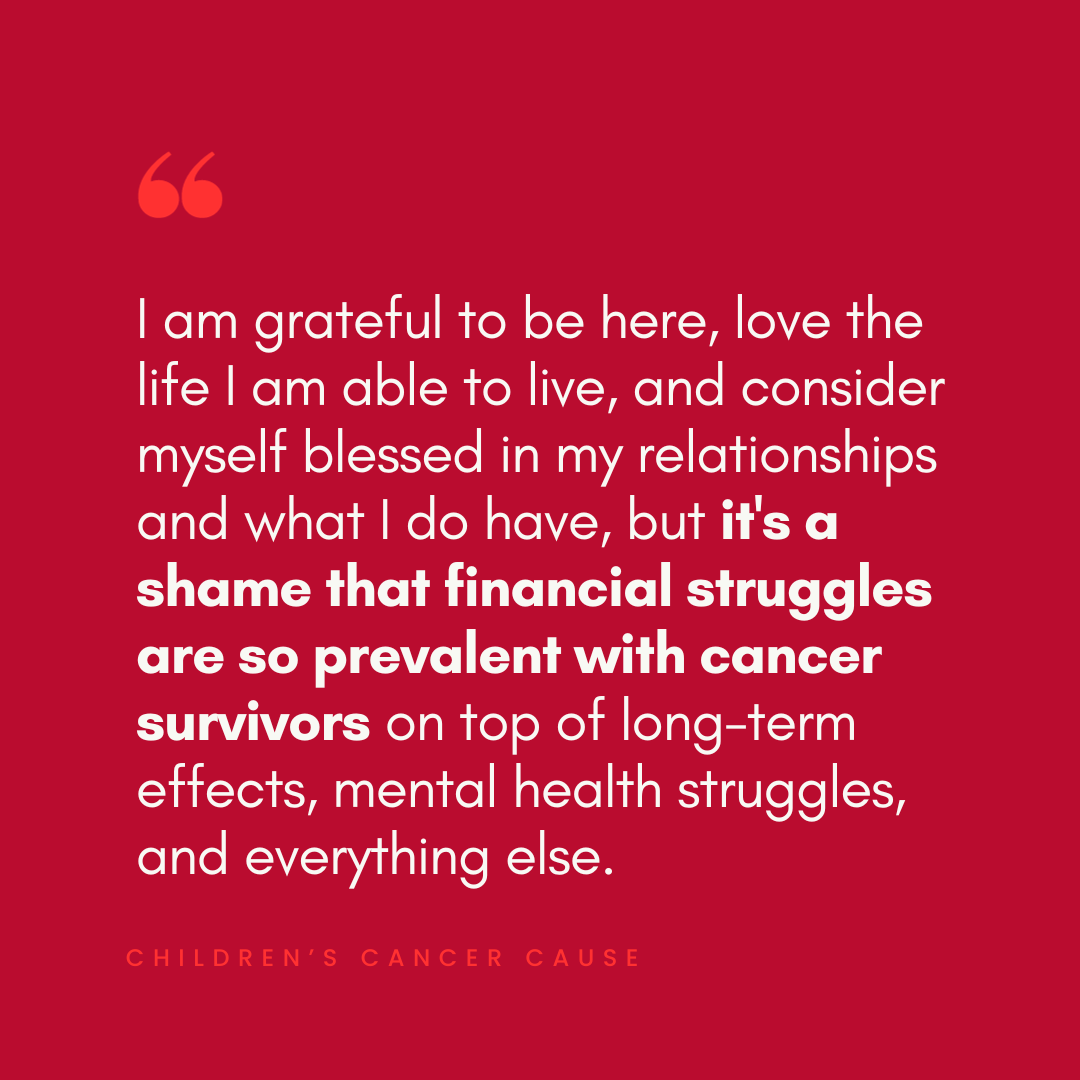2023 Survivorship Survey Results
We invited teen, young adult, and adult survivors of childhood cancers to participate in our annual survey of survivor needs in the summer of 2023. Much of what we heard from survivors aligns closely with current policy initiatives, including the Comprehensive Cancer Survivorship Act and a white paper on transitions in care that will be released in the coming months.
We thank every survivor who participated for helping to ensure that we are best representing the unique needs of childhood cancer survivors in our program planning and in our policy work on Capitol Hill.
Top Three Concerns: Relapse, Second Cancers, Fertility
-
This fear is not unfounded. Of the survivors we surveyed, 24% have had a relapse or recurrence of their primary cancer and 12% have been diagnosed with a second cancer.
“Relapse is a constant thought in my head and every little thing that happens to me (ie a new pain) I jump to it being related to cancer or treatment even if it has nothing to do with it.”
“Nearly 7 years post remission, I have that fear of my cancer recurring. That fear is with me every time I have a new pain, every time I get sick, and every time I feel "off" in any way. That fear never leaves, and it affects the way I approach healthcare for myself.”
“Even though I’ve been out of treatment 10+ years, I worry every day that it is going to come back.”
-
“I am 11 years out from radiation, and am experiencing late effects of radiation including major tooth decay and fertility problems.”
“A late effect of my chemotherapy has been primary ovarian insufficiency, leading to risks of future infertility, so we chose to undergo embryo preservation.”
“I can’t have children naturally, and my heart is damaged.”
-
“Six years later I have some neurological damage to my hands and bouts of severe fatigue. I suffer from PTSD there was no counseling at my hospital even though I requested it during and after. I now receive it privately and struggle to make progress.”
“It's been a a wild 36 years of survivorship for me. Surgeries, mental health issues, chronic pain, neuro impacts, etc. But I’ve always had hope!”
“On any given day, I would struggle with anxiety, panic attacks, and/or temporary bouts of depression. I would be easily flustered, stressed out, and extremely sensitive to criticism. I needed to begin to work with a mental health specialist (ADHD and trauma-specific) to overcome the challenges I face more effectively.”
Ongoing Gaps in Transitioning Care
When cancer survivors transition from active treatment to general care, it is recommended that they receive a record of treatment (summary of care) and a Survivorship Care Plan to share with future health providers throughout the survivor’s lifetime.
This remains a problematic gap in transition services, with far too many childhood cancer survivors reporting that they don’t have or have lost track of this documentation.
In our survey, over half of survivors report that they don't have a Survivorship Care Plan or have "lost track of it." More survivors reported to us that they do have a treatment summary (55%). This is a much higher number than in some other surveys, such as this 2020 study by Ford et al. using data with a much larger sample size from the Childhood Cancer Survivor Study, which found that fewer than 20% of adult survivors of childhood cancer have a treatment summary.
Do you have a summary of your care and treatment history?
Do you have a Survivorship Care Plan?
“I have access to my records but I am not sure I have a summary of care that is ‘nice and neat’ for other providers.”
“Transitioning into my first year of college and trying to manage survivorship care with no care plan in place feels impossible.”
-
type of cancer
severity
date of diagnosis
pathology report
key scans
complications experienced during treatment
clinical trial details
-
A schedule of recommended health screenings and check-up tests
Specific late effects to treat or monitor
Recommended psychosocial support
Advice regarding healthy behaviors
Specialist referrals
Some survivors reported that they received this documentation but not in digital format or have misplaced these records over the years. Of those who do have a Survivorship Care Plan, half report that they "rarely or never" look at it or they "haven't looked at it in awhile and should probably review it more often."
We continue to hear that older survivors - those treated several decades ago - have the biggest challenges with their records. “When I went through [treatment], they didn’t have this kind of information,” says a survivor who was treated 56 years ago as toddler. “I’m the one doing all the research and can’t get help from anybody because I’m ‘too long of a survivor.’”
This feedback from survivors gives us valuable information about ongoing gaps in transitioning care and long-term primary care. .
Gaps in Primary Care Knowledge
Far too many survivors report that they - and their non-oncology medical providers - are underinformed about their treatment history. Approximately 35% of survivors surveyed report that in the last year, their non-oncology doctors "rarely or never" seemed up-to-date about the care their patient has received from cancer specialists.
Survey comments underscore survivor frustration with their primary care providers. One survivor told us that “doctors aren’t trained to handle our cases. Once you’re in remission, they just dismiss your concerns.”
In the last 12 months, how often did your general practitioner or other non-oncology doctors seem informed and up-to-date about the care you received from cancer specialists?
“I’ve been waiting for a survivorship program, but have never found one for someone my age, not even where I was treated. It has been very frustrating. ”
Are you receiving long-term follow-up survivorship care?
Long-Term Follow-Up Care
About half of the survivors we surveyed are receiving follow-up care from a survivorship clinic and many others report that they “are receiving follow-up care but not from a survivorship clinic.”
Similar to previous years that we have surveyed, 16% of respondents told us that they are not receiving follow-up care.
Of those not receiving follow-up care, half are over age 40 and were treated at least 25 years ago.
This aligns with research showing that rates of follow-up care are high within the first five years post-treatment, drops during 6-10 years post-treatment, and continues to decrease over time.
Drug Shortage Crisis Impacts Survivors, Too
We know that pediatric oncology drugs for children in active treatment have been in and out of shortage for several years now. A recent Alliance for Childhood Cancer survey found that over half of childhood cancer patients experienced a shortage or unavailability of a life-saving therapy during treatment. Our May 2023 public comment letter to the Senate Homeland Security and Government Affairs Committee addresses this issue, and we continue to work with lawmakers and the childhood cancer community to find solutions that mitigate current and future shortages.
We also know that chemotherapy and other cancer-treating medications aren’t the only ones facing shortages. We asked survivors - those not in active treatment - whether they’ve been impacted by non-oncology or over-the-counter shortages over the past year. One in ten surveyed survivors have faced a non-oncology drug shortage in the past year.
We heard about shortages in ADHD medication (“I struggled to perform my job to my fullest capability,” one survivor told us), CPAP and IV supplies, and sodium bicarbonate for the treatment of high blood levels of C02.
“A late effect of my chemotherapy has been primary ovarian insufficiency, leading to risks of future infertility. We were impacted by a shortage of prescription drugs for our infertility treatment,” one survivor shared. “This initially meant delaying fertility treatment, then later, we ordered the drugs from another country (and under a generic not sold in the US) in order to be able to pursue treatment.”
The Voice of Survivors: In Their Own Words
In open-ended questions, we asked survivors to tell us about how cancer or its long-term late effects impact their daily life and to share some of the biggest challenges they’re currently facing.
Several college-aged survivors opened up about cognitive learning difficulties. This 2019 study reported that cognitive impairment affects up to one-third of childhood cancer survivors.
A teen survivor of leukemia shared that they’re suffering from slow processing and executive dysfunction issues as a result of treatment. “Things like word finding, reading comprehension, and remembering math facts are some of the issues I have on a daily basis. As a high academic achiever, these issues stick out to me and frustrate me daily, sometimes to the point of tears and breakdowns.”
Here’s more of what we heard about challenges with college:
Older survivors shared similar challenges with employment and workplace settings.
An early-career leukemia survivor expressed gratitude that they’ve had supervisors who’ve worked with them to find strategies to help navigate the trouble spots where their disabilities may be impacting their performance. They shared some things about their workplace that help set them up for success: “I often record or transcribe important meetings and use the transcript to create meeting notes that cover detailed, multi-step instructions. Additionally, I have the flexibility to set a schedule that works best for any physical symptoms I may be experiencing. I also work in a private office space, which reduces the potential for external distractions.”
Challenges with education and employment naturally exacerbate financial struggles that survivors face.
One survivor talked about how they make $16.75 as a nurse tech, which is not enough to support themself independently with bills, a car that is older, a cell phone, and housing rent around $1200-1400 where they live. They’d like to go back to school to become a nurse so they can make more money, but they feel too limited by their cognitive and physical late effects.
Another young adult survivor of childhood leukemia expressed anxiety about whether they’ll ever be physically or financially strong enough to move out of their parents’ house and frustration about feeling behind in life: “Cancer took away important years where I would have finished school and started working at a full-time job. Right now I’m still finishing school and am staring my educational debt in the face with no money coming in. Finances look really bleak to me.”
Many survivors opened up about their mental health challenges, especially anxiety, depression, and post-traumatic stress disorder (PTSD).
Although it is normal for survivors to experience mental and emotional late effects brought on by fear of relapse and additional late effects, stress about follow-up visits, sadness about the loss of normalcy, and even guilt about surviving when others did not, it’s important for survivors to recognize the signs of psychosocial distress and know when to seek additional support from healthcare providers.
Whether the late effects are physical, mental, or emotional, the impact on a survivor’s quality of life can be severe. And it often feels unrelenting and cascading. As one survivor put it: “Even when you are deemed ‘cancer free,’ childhood cancer is never really over due to chronic illness, fear of recurrence, countless appointments, and more.”
Here’s more of what we heard from survivors regarding the detrimental impact of long-term late effects on their daily life:
We know that some survivors experience more severe, disabling, and even life-threatening late effects than others. Risk factors for severity of late effects can include how long ago the survivor was treated (due to modifications in treatment and increased efforts to mitigate late effects), the child’s age at treatment, and the type of cancer, its location, and its treatment regimen.
More severe late effects can require much more invasive measures to manage. One survivor told us they developed avascular necrosis (AVN) from steroids taken during treatments, which has required five surgeries and multiple medications to manage the pain: “This causes insecurity, anxiety, and fear in my daily life and especially in new situations. It’s so hard to trust my body.”

